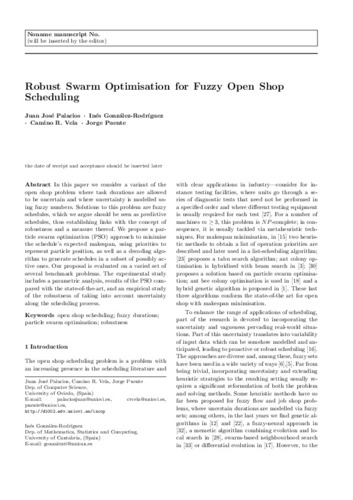Robust swarm optimisation for fuzzy open shop scheduling
Palabra(s) clave:
Open shop scheduling
Fuzzy durations
Particle swarm optimisation
Robustness
Fecha de publicación:
Versión del editor:
Citación:
Descripción física:
Resumen:
In this paper we consider a variant of the open shop problem where task durations are allowed to be uncertain and where uncertainty is modelled using fuzzy numbers. Solutions to this problem are fuzzy schedules, which we argue should be seen as predictive schedules, thus establishing links with the concept of robustness and a measure thereof. We propose a particle swarm optimization (PSO) approach to minimise the schedule’s expected makespan, using priorities to represent particle position, as well as a decoding algorithm to generate schedules in a subset of possibly active ones. Our proposal is evaluated on a varied set of several benchmark problems. The experimental study includes a parametric analysis, results of the PSO compared with the state-of-the-art, and an empirical study of the robustness of taking into account uncertainty along the scheduling process
In this paper we consider a variant of the open shop problem where task durations are allowed to be uncertain and where uncertainty is modelled using fuzzy numbers. Solutions to this problem are fuzzy schedules, which we argue should be seen as predictive schedules, thus establishing links with the concept of robustness and a measure thereof. We propose a particle swarm optimization (PSO) approach to minimise the schedule’s expected makespan, using priorities to represent particle position, as well as a decoding algorithm to generate schedules in a subset of possibly active ones. Our proposal is evaluated on a varied set of several benchmark problems. The experimental study includes a parametric analysis, results of the PSO compared with the state-of-the-art, and an empirical study of the robustness of taking into account uncertainty along the scheduling process
Descripción:
The final publication is available at Springer via http://dx.doi.org/10.1007/s11047-014-9413-1
ISSN:
Identificador local:
20141356
Patrocinado por:
This work Has been funded by the Spanish Ministry of Science and Education under research grants MECFEDER TIN2010-20976-C02-02 and MTM2010-16051 and by the Principality of Asturias (Spain) under grant Severo Ochoa BP13106
Colecciones
- Artículos [37548]
- Informática [875]
- Investigaciones y Documentos OpenAIRE [8420]
Ficheros en el ítem




